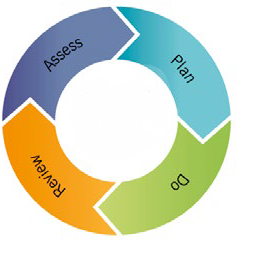We hope that you find this page helpful. If you have any questions, you can contact us.
Your rights
The law says that all schools and colleges must provide children and young people with special educational needs and disabilities (SEND) with access to education and learning.
SEND means having a disability or condition that makes learning harder and they need additional support that is above the support given to other pupils who are the same age.
You can read more about what the law says on ‘your rights page’.
Support through the Graduated Approach
If you have SEND, then your school or setting should be working with you to see what needs you have and how they can support you with these. This is known as the 'graduated approach' and has 4 steps that they should follow:

-
Assess – Understanding what needs you have
-
Plan – Agreeing what support they will give you, how often and who will be responsible for it
-
Do – The plan is followed, and the agreed support is given to you
-
Review – Check if the plan is working by looking at your progress (at least three times per year) and asking for your thoughts and feedback.
This support should be on-going which means they keep repeating the cycle above.
If the support they are giving you is not helping enough then it might be helpful to think about an Education, Health and Care (EHC) needs assessment
Support options
Support can be given in lots of different ways. Below are some examples of what might be offered to you:
-
extra help from a teacher or a learning support assistant
-
making or changing materials and equipment
-
working in small groups
-
observations in class or at break time
-
support to take part in class activities
-
help to work or socialise with other pupils
-
support you with physical or personal care needs
-
one-to-one help with some tasks such literacy, maths or speech and language
If you would like to know what support is available at your school or college, you could ask for a meeting to talk about this with them. You might find our decision making toolkit helpful to do this.
If thinking about a change of school or setting, please visit our education information and advice page.
What you can do
If you think that you might need some more SEND support than you are already getting in your school, college or setting then you could:
-
Speak to a teacher or trusted member of staff, to ask how they can help you to learn and support you with your social, emotional and mental wellbeing.
-
Speak to a parent or trusted adult, to help you to have these conversations and attend meetings with you if this would be helpful.
If you don't already have an Education, Health and Care plan (EHCP), you can ask for an EHC needs assessment
If you do have an EHCP, you could ask to have it looked at (reviewed) to see if there is more support available to help you.
You can get in touch for more information, advice and to talk about how we can help. You can also contact us through our advice line the telephone helpline:
How we can help
We can work with you and offer support to suit your needs. This may include speaking on the phone, emails or by helping you to arrange a school/ college visit or meeting. With your permission, we can also work with your parent, carer or support worker.
You can get in touch for more information, advice and to talk about how we can help. You can also contact us through our advice line the telephone helpline:
You might find this video from the CDC about IAS services and what they do helpful:
Disclaimer
Whilst we hope that you find these resources helpful, the information in this section is not endorsed by Leicestershire SENDIASS and we're not responsible for the content of sites or services offered by third parties.